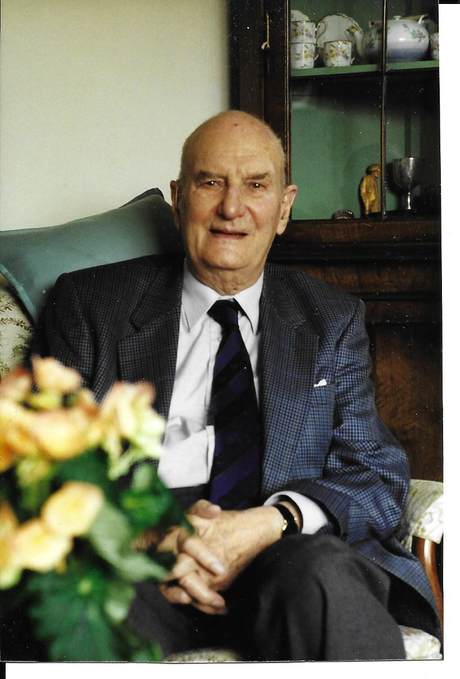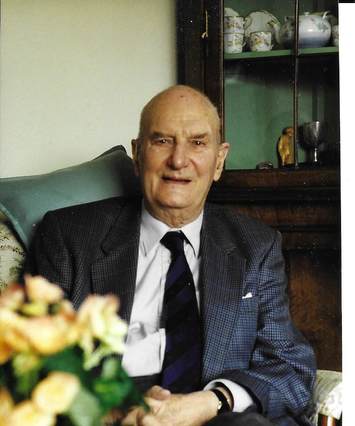It has been lovely to receive so many letters and e-mails about Dad in the last days—over 80. All of them speaking of Dad’s positive outlook on life, his sense of fun and warrior spirit, and his steady friendship over many years.
He was a wonderful father to me and grandfather to Chloe and Nicholas. I remember family life being secure and fun when I was little, with stories from him at bath time, lots of jokes and riddles at meals, and Dad’s piggyback rides when I got tired on long walks—Dad was someone you had to run to keep up with and this was true throughout his life. You could say anything to him, he wasn’t easily shocked as he had “been there, done that” himself, so he understood and related to you. His life was full and his interest in people great.
Always proud of his Yorkshire background, one ancestor was the first sailing master to introduce steam into the Hull-Rotterdam trade, in 1833, while another, Sir Thomas Bouch, had designed and built the first Tay Bridge in 1879. The collapse of this bridge was blamed on the wind-speed directions given to him by the Astronomer Royal who, it turned out, was an ancestor of my mother’s. Dad never held it against her!
Dad’s grandparents and parents came from the manor houses in the villages of Burton Fleming and Reighton in East Yorkshire. His family moved around a lot as Dad’s father was a commander in the merchant and royal navies. He and his sister Kathleen went to eight or nine schools, and he was always telling us of the pillow fights in the school dormitories, mice being sent up to teachers in the chalk box, and quite a lot of caning—a mischievous streak which he managed to hang on to all his life. When his father was away at sea, his mother (who had been one of 17) took charge, and was still waving her stick at the traffic in her nineties. Dad very much took after her. When I was talking on the phone earlier with Dad’s cousin in Yorkshire, he was recounting what fun they all had in the early days.
At 16, Dad entered the National Provincial Bank on a salary of £60 a year, in Faversham, Kent, and he remained with the bank, which became the NatWest, till retirement. One of the letters I received was from his very dear old friend, Jean-Louis, whom Dad had first cared for when as a young Frenchman he had been assigned to the bank, under Dad’s charge, in the City. They remained close friends, Dad last visiting him in Paris when he was 86, and J-L visiting Dad at Hall Grange.
Dad loved life. He loved jazz and played the drums in a jazz band in his twenties. He was a good sportsman and ran for Luton United Harriers—we have the cups at home—and he played hockey for the bank till he was 50. His weekends and holidays were taken up with friends and clubs, mountaineering, climbing and potholing, cycling and walking.
It was on one of these walks in Yorkshire in the 1930s that he met a cyclist wanting to know of a local watering hole. In true fashion, Dad shared his flask with him and in return the man invited Dad to an open-air meeting of the Oxford Group. Dad said later that all he really remembered of the meeting was someone saying that “God has a plan for your life”. At the time he wasn’t very interested in God, but he was certainly interested in a plan—as he was up on a drink-driving charge from the police, having smashed up his sports car.
But in the months following he did find a deep faith in God that sustained him throughout his life. He was always a great believer in the “ticks of guidance”, as he called them, that God could give you in everyday life—whether to be at a certain place, or meet a particular person. His faith was very down to earth—and he took this into his job and into the Navy during the War. He was called up in 1942, after being in a reserve occupation in the bank, and posted to Chatham, where he really stuck his neck out dealing with the pilfering that was going on in the supply stores.
He was posted to Iceland for a year, a country he grew to love very much. He was then transferred to a frigate patrolling off France, prior to the D-day landings, and while there his ship was blown up. Dad was in the sick bay at the time of the explosion and was trapped as the ship was sinking. The cabin door wouldn’t open, and he prayed to God for escape. He had the clear thought to push on the door and it fell out, the hinges broken. After several weeks in hospital, he was posted out East to India, Burma and Thailand, where he was in charge of supplies on a tank-landing ship. They were one of the first ships to bring rice to liberated Singapore at the end of war.
After demob, Dad and a friend went back to Iceland, renewing friendships there and helping resolve a major dispute affecting the fishing industry, through his contacts. Ever since then he kept a picture over his bed of a sculpture of Christ by his good friend the Icelandic sculptor Einor Johnsson.
One of the best things he ever did, he said, was to marry Mum and they settled in south-east London, where there was a constant stream of friends staying or coming in and out for meals. Many of these friends have written of the care and support they received from them, at that time.
For the next years, Dad was back at the bank in the City, commuting 9 to 5 every day in his bowler hat. Although the attire may have been conventional, Dad certainly wasn’t and at one point, as a member of the bank employees’ union, he played a part in helping to resolve an impending national bank strike, through friends in the city.
Mum and Dad were great supporters of Christian theatre at the Westminster Theatre, owned by MRA. Dad had donated his war gratuity for its purchase. He took early retirement at 60, when he and Mum went to India for a year, where they hosted an MRA residence in Pune, before returning to settle in Sevenoaks.
Always the activist, it was a great blow when Dad suffered a massive heart attack in his late 60s. The doctors were quick to tell him all the things he shouldn’t do—digging in the allotment, etc.—“But what can I do?” he would say. In fact, he started to write his memoirs and family history in letters to his grandchildren, Chloe and Nicholas—and it is wonderful to have that history with us now.
A few years later, after Mum had died, he was diagnosed with prostate cancer. Following an operation, he was wheeled back to the ward and I remember finding him sitting up in bed with a temperature of 102, chatting to a neighbour—very Dad. He took up the banner of the Third Age, believing the elderly generation had so much experience to pass on, and joined a scheme for students from Sevenoaks School to visit the elderly. Most students would come to shop for their elderly folk—but Dad spent his one or two hours a week in lively conversation with his students. Whether they got a word in edgeways was another matter!
He came up here to Hall Grange Residential Home, not least to be with his old school friend Hugh, from St Lawrence College, and his Best Man at his wedding, Leslie. He was cared for so well by all the staff and he looked on everyone there as his friends and family. After a few strokes and illness, having been determined to stay around for as long as possible, he passed peacefully on to his last home. We miss him greatly but know that there is great rejoicing on the other side.
Henry lies buried in Greatness Park Cemetery, Sevenoaks, alongside his beloved wife, Jan’s mother, Grace.
English


